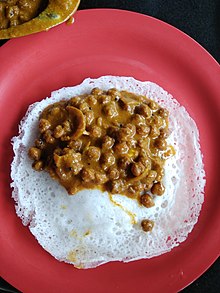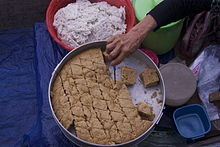Appam (food)
Appam is a type of pancake that originates from the Indian subcontinent and is made from fermented rice dough and coconut milk . Appam's origin is disputed; possible sources of origin could be Sri Lanka or the southern tip of India. It is a common food for Sri Lanka, Tamil Nadu, and Kerala . It is most commonly eaten there for breakfast or dinner.
history
Quoting the food historian KT Achaya, Vir Sanghvi, an Indian journalist, explains that Appam is mentioned in the Tamil Perumbanatruppadai . KT Achaya says in the last book published in Lifetime that Appam was well established in the ancient Tamil land .
Regional names
In Malayalam it is called appam (അപ്പം), aapa in Tulu , appa (ආප්ප) in Sinhala , aappam (ஆப்பம்) in Tamil , chitau pitha (ଚିତାଉ) in Oriya , paddu or gulle eriyappa in Kodava and arpone in Burmese . Appam is generally referred to by its anglicised name. Funnel , in Sri Lanka . In Indonesia it is known as kue apem .
Variations
Simple appam
Simple Appam or Vella Appam are bowl-shaped, thin pancakes made from fermented rice flour. They take their shape from the small appachatti in which they are baked. They're pretty tasteless and are mostly served with spices or curry. These cups are made from a batter with rice, yeast, salt and a little sugar. After the mixture has been left to stand for a few hours, it can be fried in the appachatti with a little oil. In the southern center of Kerala it is mostly served with chickpeas (kadala), curry , mutton or vegetable stew or roast eggs.
Palappam
Palappam is prepared with a spoonful of thick coconut milk / coconut cream that is placed in the doughy center. After cooking, the center feels firm but remains soft on the inside and is sweeter because of the coconut milk.
Kallappam
This is a form of appam in which kallu ( palm wine ) is added to the fresh dough to start fermentation. But it can also mean appam on a grill plate ( kal ) instead of appachatti .
Egg cups
They look the same as the funnel shape, but an egg is added to the pancake when it is baked.
Honey funnel
Honey funnels are pancakes cooked with a generous amount of palm syrup . Some people also like to add some jaggery just before serving to make it extra sweet.
Idiyappam
Idiyappam (String funnel or Noolputtu) is prepared from rice - noodles produced which are curled into flat spirals. It is served for breakfast with thin fish or chicken curry, which consists of just one or two pieces of meat with dhal ( lentils ) and spicy sambal or fresh chutney . String funnels are made from steamed rice flour that is made into a dough with water and a little salt. This is then pressed through a mold similar to the one used to make pasta . The "noodles" are cooked by steaming. Some people even sprinkle grated coconut on top of the rice noodles. The string funnels can be bought ready-made and are consumed by the people of India and Sri Lanka for breakfast or dinner. There are many variations depending on the type of flour used, etc. This simple dish can be customized by adding scrambled eggs or vegetables with other foods such as biryani to the string funnel. Another example can be found in Kerala: Idiyappam Paaya (goat leg soup made from coconut).
Achappam
Achappam is a deep-fried rose biscuit made from rice. According to KT Achaya, this dish comes from the Thomas Christians .
Kuzhalappam
Kuzhalappam is a typical Syrian-Christian dish, consisting of fried chips that are rolled up like a tube.
Neyyappam
According to KT Achaya, Neyyappam owes its origins to Kerala and is a typical meal of the Thomas Christians in Kerala. It's made with rice flour, boiled butter, and ghee .
Unni Appam is a variation in which pureed plantains are added to the dough . The batter is made from rice flour, jaggery and plantains. It is poured into a vessel called "appakarai" or "appakaram", in which ghee is heated to a high temperature. The appams are shaped like small cups and are baked deep brown. Both Neyyappam and unni appam are eaten as snacks.
Pesaha appam
Pesaha appam is prepared by the Thomas Christians in Kerala during Passover . This type of appam is dipped in syrup or "pesaha pal" (Passover coconut milk) before serving.
Vattayappam
Vattayappam is made from rice flour, sugar and coconut. It is an oil-free snack for the majority of households in Kerala. The dish is made by steaming the dough and is very similar to Bánh bò from Vietnam .
Kandarappam
Kandarappam is a sweet dish made from rice and all 4 dals and jaggery. The dish contains all the ingredients that in Hindu tradition are said to bring good luck. The use of all 4 Dals is considered auspicious at festivals.
Kue apem
In Indonesia , a variant of Appam is known as Kue Apem or Kue Apam . It is an Indonesian cake (kue) or traditional dough cake made from rice flour, coconut milk, yeast and palm sugar, which is usually served with grated coconut. In traditional kitchens there is Kue Apem at festivals and celebrations. For example, Kraton Ngayogyakarta Hadiningrat traditionally hosted a ngapem ceremony where the royal household cooks kue apem ( Javanese version of appam) together as part of the Tingalan-Jumenengan-Dalem ceremony . It is quite similar to Kue mangkok . Just like Kue Putu , it is derived from the Indian influence on Indonesian cuisine .
See also
- List of all Wikipedia articles whose title begins with pancakes
- List of all Wikipedia articles with a title containing pancakes
- Commons : Appam - collection of pictures, videos and audio files
Individual evidence
- ↑ 12 Sri Lanka foods visitors have to try . CNN.
- ^ Encyclopedia of Jewish Food, Gil Marks, 2010, published by John Wiley & Sons, ISBN 978-0-470-39130-3 .
- ↑ https://en.oxforddictionaries.com/definition/appam
- ↑ Vir Sanghvi: Rude Food: The Collected Writings of Food Vir Sanghvi . Penguin Books India, 2004, ISBN 0143031392 , p. 110.
- ↑ Subhadra Sen Gupta: Always Ready for Appams! . In: Let's Go Time Traveling . Penguin UK, 2012, ISBN 818475678X .
- ↑ KT Achaya: The Story of Our Food . Universities Press ,, ISBN 81-7371-293-X , p. 80.
- ↑ Appams - Appam Recipe - Hoppers - Hoppers Recipe . Indianfood.about.com. March 2, 2011. Retrieved November 21, 2011.
- ↑ a b Times of India food article from Apr 10,2010 . Times Of India.
- ↑ KT Achaya: Indian Food: A Historical Companion . Oxford University Press, 1997, ISBN 0195644166 .
- ↑ Kuruvilla Cherian Amprayil: Kerala Nazranee Pesaha Receipes . Nasrani Syrian Christians Network. March 16, 2008. Retrieved August 22, 2009.
- ↑ Vattayappam- an oil free tea time snack - Appam - Palappam - Pesaha Appam - Kerala Cuisines - Cake - Snacks - Steamed .
- ↑ Kue Apem Kukus ( Indonesian ) Sajian Sedap. December 16, 2010. Retrieved June 25, 2015.
- ↑ Para Puteri Sri Sultan Luwes Membuat Apem di Prosesi Ngapem - Tribune Jogja (id ID) . In: Tribun Jogja , April 14, 2018.
Web links
- Traditional Appam Recipe ( English )
- Kerala style Appam recipe (rice and coconut pancakes) ( English )
- STRING HOPPER MAKER 2008 Thayabi Products Inc ( English )
- Pal Appam Recipe - Maya Kaimal ( English )
- Pesaha / Indri / Inri Appam recipe with step by step instructions and pictures ( English )







